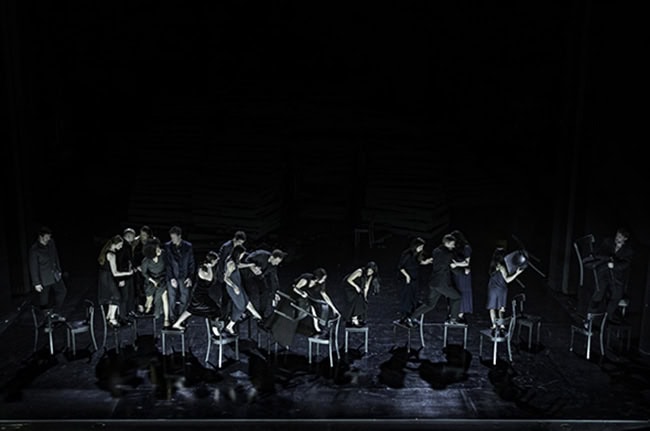Tanztheater Wuppertal Pina Bausch: Since She at Sadler’s Wells
Posted: February 19th, 2019 | Author: Nicholas Minns | Filed under: Performance | Tags: Breanna O'Mara, Dimitris Papaioannou, Fernando Jacon, Franko Schmidt, Michael Strecker, Oleg Stepanov, Stephanos Droussiotis, Tanztheater Wuppertal Pina Bausch, Thanos Papastergiou, Tina Tzoka | Comments Off on Tanztheater Wuppertal Pina Bausch: Since She at Sadler’s WellsTanztheater Wuppertal Pina Bausch, Since She, Sadler’s Wells, February 16

Over two weeks Sadler’s Wells is presenting two full-length works that have been created on Pina Bausch’s company by choreographers Dimitris Papaioannou and Alan Lucien Øyen; each of the choreographers has worked with half of the dancers of Tanztheater Wuppertal developing specific responses to their respective commissions. It is a major shift for the company that, since Bausch died in 2009, has been performing her repertoire as a kind of continuous wake around the world.
Papaioannou, who has been deeply influenced by Bausch’s work since he first saw Café Mueller and Sacre du Printemps over thirty years ago, has essentially marked the end of this period with what appears to be a memorial in which he has superimposed the visual grid and cultural allusions of his own work (and his own creative team) on the heart of Bausch’s company. Tina Tzoka’s stage is dominated by a stack of charcoal grey foam blocks piled at the back of the stage that form interlocking plates not dissimilar to the tectonic configuration in The Great Tamer. Here it gives the set, under the lighting of Fernando Jacon and Stephanos Droussiotis, an archaeological aura as if we are below the rim of the living world, in an excavated underworld teeming with workers in Thanos Papastergiou’s costumes uncovering each other and revisiting the relics from their past. Since She is a dark, intricately layered procession of images that moves in all directions and hinges on precarious balance, cruel wounds and uprooted history bound in a common grief. And yet, despite quotations from Bausch — the chairs from Café Mueller, for example, form here a complicated bridge across the stage and act as a tangible leitmotiv to Papaioannou’s imagination — the work doesn’t look back with regret or sorrow but marks a solemn occasion where the future might well begin. It is the company that is in the process of being excavated in a post-Bausch world, revealing itself in a new light; the dancers carry Papaioannou’s imagery superbly.
Ruth Amarante repeatedly mounts to the top of the pile of foam blocks, makes her treacherous way down and disappears into a crack; a naked, swathed Breanna O’Mara slides down slowly head first, limbs interlaced in the unfolding motion of life toward death. To the sound of sawing emerges a head of John the Baptist that Papaioannou’s sleight-of-hand then turns into that of Medusa between the legs of Scott Jennings. Oleg Stepanov is a Hyeronimus Bosch-like figure stumbling across the stage on two poles stuffed through his trousers, Franko Schmidt a cymbal-carrying musical compère, and a chorus of high-heeled feet teasingly dances upstage behind a cardboard dress. Two upturned tables become boats on a sea of cardboard rollers: it’s a calm outing on the river until all the performers crowd onto one of them to evoke the classical crossing of the Styx by the souls of the deceased. Throughout Julie Anne Stanzak in an elegant black/gold evening gown presides goddess-like over the unravelling incidents and tableaux.
The work ends with Michael Strecker collecting and piling on his back the bridge of chairs one by one until he collapses under their weight, while Amarante delicately surfs on the cardboard rolls under her bare feet, a ghostly figure wafting in the evening light along the seashore. The other dancers gather around her for a group photograph against a golden tombstone; as it gently lowers and the performers disperse into the dark on either side, stars shine through it to Tom Waits’ song Green Grass: ‘Don’t say goodbye to me, describe the sky to me’. Since She is, as Papaioannou admits, a love letter to Bausch that shows not only his debt to her imaginative world but his response to its rich, dark, impenetrable roots.